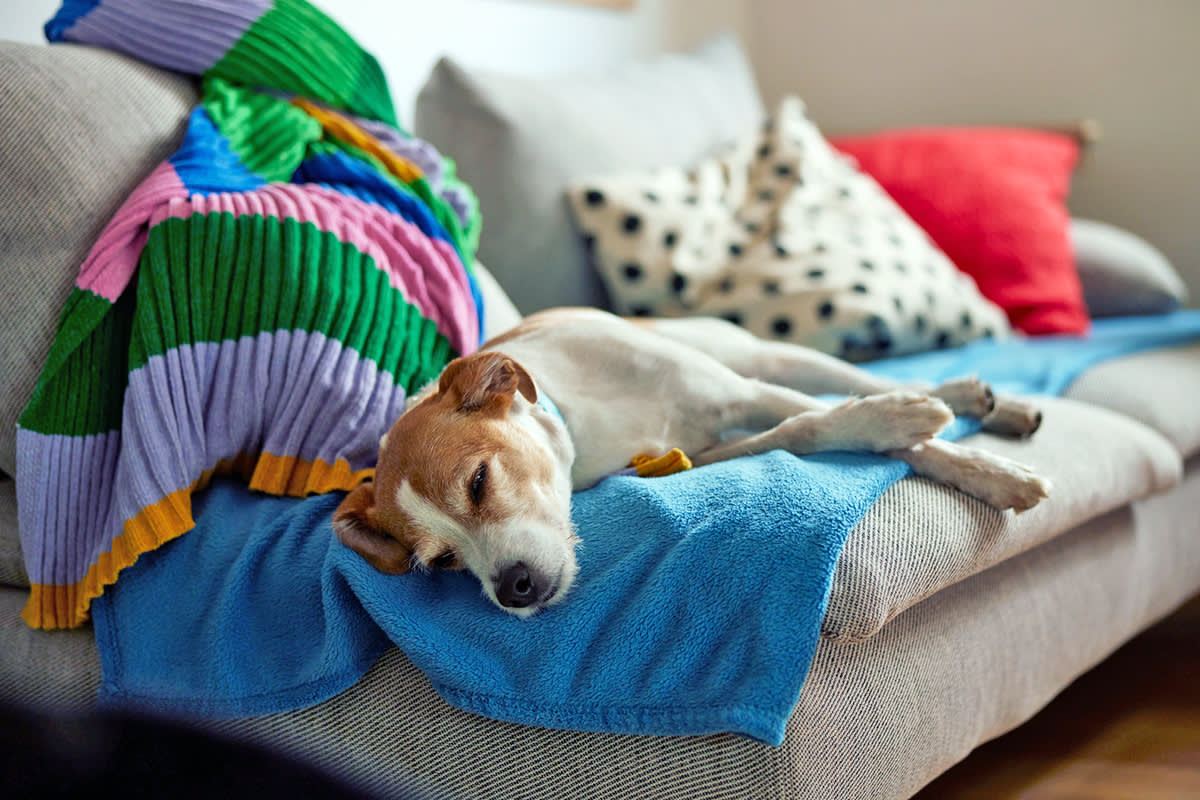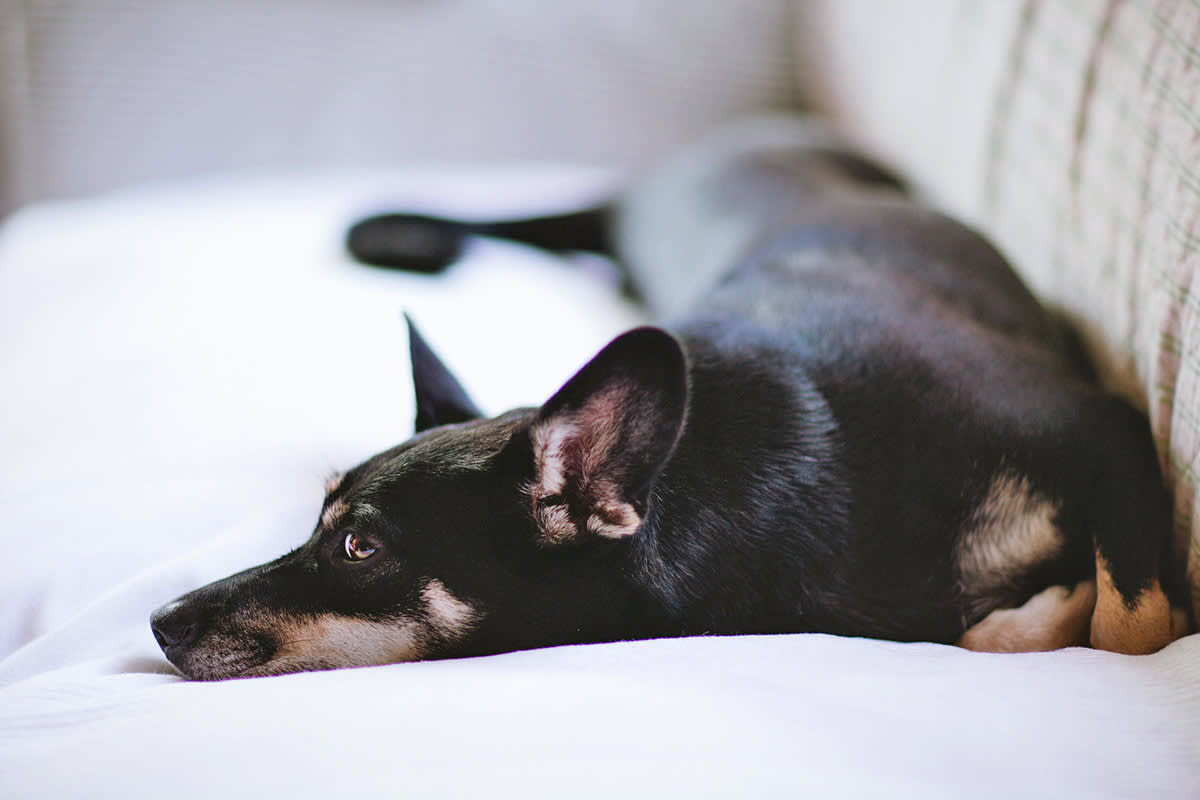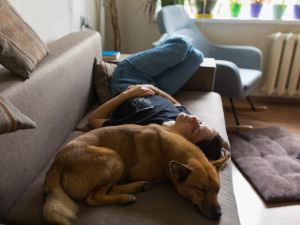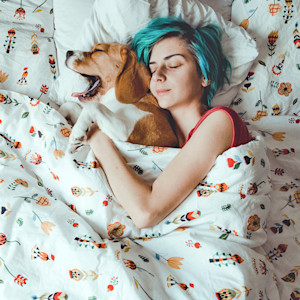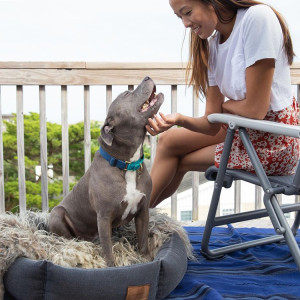6 Signs Your Dog Isn’t Getting Enough Sleep
Is your dog getting the necessary 10 to 12 hours a day?
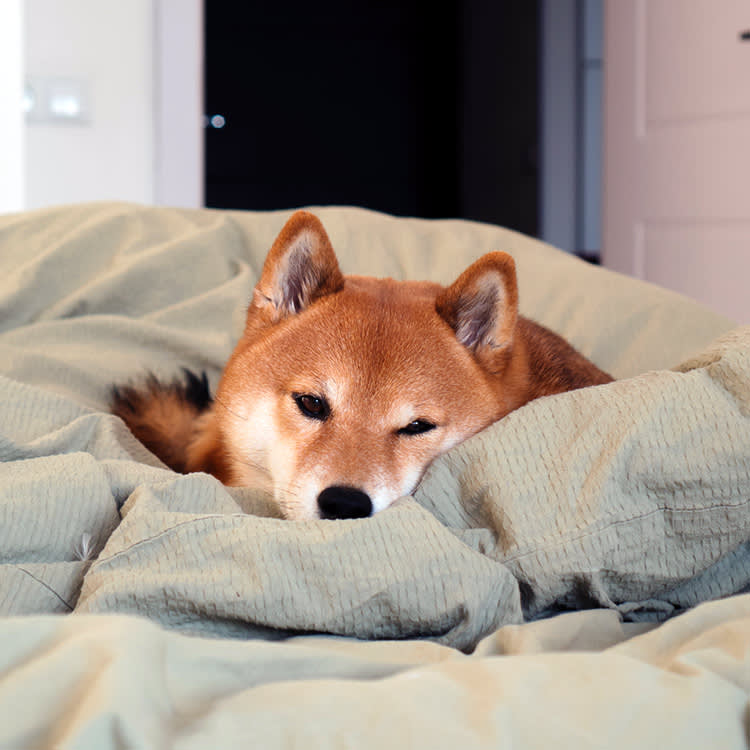
Share Article
You know that feeling when you haven’t slept all night, and your whole vibe goes from mostly together to pure zombie? Yeah, same for dogs. When they haven’t had enough Zs, they are not at their very best, and it can affect them in all kinds of ways.
Because your pup isn’t working a 9-to-5 job like you, the stakes of their lack of sleep may seem fairly low. It’s not like they‘re performing complicated brain surgery or driving a school bus full of kids. In fact, despite their weight-of-the-world sigh, they tend to have very few responsibilities. But that doesn’t mean they don’t need their sleep — they actually need about 12 to 14 hours every day. (So, yes, those extra naps they take intermittently while you are yolked to your laptop actually do matter.) If they lose out on that snooze time, it can affect their body, behavior, and mood — which, in turn, affects you.
Here are six ways you can tell if your dog hasn’t had enough sleep — and what to do about it.
They act like an overtired toddler.
You’d think a sleepy dog would be super chill, right? Nope! Lots of sleep-deprived dogs act more like they’ve had too much coffee. Instead of being calm, they may act restless — pacing non-stop, barking excessively, or chewing on things that they shouldn’t (like your favorite boots). Counterintuitively, tired dogs often act a lot like under-exercised dogs dealing with pent-up energy. Think of it like a toddler who missed their nap; they get into mischief when what they really need to do is crash.

They become a clumsy pup.
Having good motor skills requires the brain to be at its best. When they don’t get enough sleep, it’s common for dogs to be less coordinated than usual. They may be clumsier than at other times and not as fluid in their movements. So, don’t be surprised if your graceful doggo misses a ball or uncharacteristically trips over their own feet.
Their brain has a bit of a power outage.
Just like in people, lack of sleep affects dogs’ brains. When they are tired, it’s hard for them to remember things or to learn new skills because they can’t consolidate memory or process what’s going on very well.
It will be harder to train your dog to do new skills when they are tired and also more challenging to get them to show off the ones you already taught them. It may seem like they are not listening to you when they fail to respond to your cues, but it’s likely they just can’t deal with anything new right now.
They become the moodiest dog in all the land.
You know how you and your dog are for sure totally the same in some ways? And what about when you get crabby and anxious or sad when you’ve been up half the night? Well, that should make it pretty easy for you to relate in yet another way to them.
It’s practically impossible to be your best, most cheerful self when you’re not getting enough sleep, and that seems to be true for dogs, too. Some sleep-deprived pups may be more irritable, which makes them more prone to behave in a reactive or aggressive way. Other sleep-deprived dogs may act depressed and lose interest in activities they normally enjoy. That withdrawal from activities can include playing with other dogs or even hanging out with you.
They start to have health issues.
Not getting enough sleep sets off a chain of physiological and chemical changes in the body that are not good for a dog’s health. It’s common for tired pups to have an increased appetite and gain weight. Lack of sleep can have negative effects on health because it is associated with a weakened immune system.
That means a dog who is not well-rested is more likely to face illnesses and infections their body could have fought off if they had gotten enough sleep. Chronic sleep deprivation may cause elevated blood pressure, which can lead to cardiovascular challenges and heart problems. Sleep is vital for your dog’s overall health — that’s why quality naps are non-negotiable.
They have a strong response to stress.
Too little sleep can compound problems for dogs with anxiety because they need to be well-rested to handle stress effectively. Anything that triggers them will be more likely to lead to a freak-out, whether it’s a loud noise, anything unexpected in their routine, or something they dislike (looking at you, nail trimming!).
The increased stress some dogs experience when sleep deprived can lead to behavior problems associated with these feelings, including excessive spinning or excessive licking. They may act more fearful because of the stress, and they may not be able to handle pain or discomfort as well as when they have had enough sleep.
How can you help your dog sleep like a champ?
Getting enough good-quality sleep helps our dogs be their best selves, and it’s up to us to help them get there. Having a routine helps — especially before bed. If they always have a little play session, one last potty break, and then some grooming or cuddling comes right before lights out, they are more likely to get with the program. They also need plenty of exercise and mental activity during the day so they are tired enough to settle down. It’s easier to fall asleep if they have not spent too much of the day feeling bored and restless, but it’s also smart to avoid intense exercise right before bedtime.
They need a good sleeping spot (or two or three!) so they feel at peace. The area should foster being calm as well as being comfortable. It needs to be quiet and out of the way of foot traffic in the house so they can nap when they want. Make sure your dog has a relaxing place to sleep where they do not feel like they have to be on the lookout all the time; being vigilent prevents rest. Some dogs are fine by a window, but others can’t relax when they can see the outside world, and make it their job to check on everything happening outside.
Final thoughts: Sleep matters
Dogs who don’t get enough sleep are often more reactive and have bigger behavior challenges. They are often grumpy or clumsy or irritable if they are sleep deprived, and their physical health can suffer. They can be more anxious, struggle to learn new things in training, and even restless. Sleep matters, and another way we can act on our love for our dogs is to remember that when we catch them napping that they’re doing important work.

Karen B. London, PhD, CAAB, CPDT-KA
Karen B. London is a certified applied animal behaviorist (CAAB) and certified professional dog trainer (CPDT) who specializes in working with dogs with serious behavioral issues, including aggression. She has written for a variety of magazines including The Bark, Clean Run, and the APDT Chronicle of the Dog, and has published in scientific journals including Behavioral Ecology and Sociobiology, Ethology, Ecology, and Evolution, the Journal of Insect Behavior, and Insectes Sociaux. She is the author of seven books about dog training and canine behavior, including the forthcoming My Dog's Mystery Adventure: And Other Stories From a Canine Behaviorist and Dog Trainer.
Related articles
What Does Your Dog’s Sleeping Position Say About Them?
Is your pup a splooter or a donut? It turns out, you can learn a lot from how your dog snoozes.
Why Does My Dog Sleep on Their Back?
It is so sweet...
![Woman wearing a black t-shirt and jeans laying on the couch with her dog taking a nap]()
What Are the Effects of Sleeping With Your Dog in Bed?
There are pros and cons of sleeping with your dog—for both of you.
![Woman sleeping in bed with her beagle dog.]()
Does Your Dog Get a Bad Night’s Sleep When They Share a Bed With You?
You might be stealing all the covers.
![a human petting a dog on a dog bed]()
The Best Dog Beds Of 2025
Our dogs sleep with us, too. But these trainer-recommended dog beds—from indestructible ones for puppies to orthopedic options for seniors—are the next best thing.
